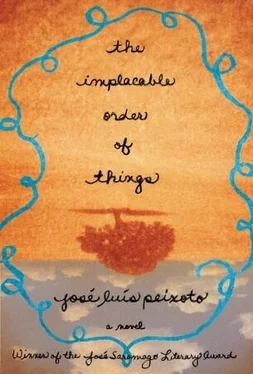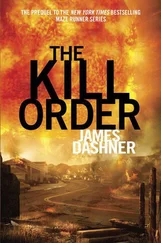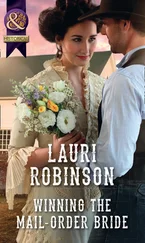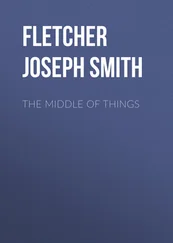IN THE MAIN HALLWAY OF THE RICH PEOPLE’S HOUSE, José’s wife was sitting before the voice shut up in a chest and heard it say: perhaps the sky is a huge sea of fresh water and we, instead of walking under it, walk on top of it; perhaps we see everything upside down and the earth is a kind of sky, so that when we die, when we die, we fall and sink into the sky.
THE SHEEPDOG WANDERED OFF, like a sad thought. The sheep kept ripping at the deep-rooted stubble, and the baby lamb, which I usually carried under my arm, since it couldn’t keep up with the others, suckled its grazing mother. The baby lamb, with a slender body, short and softer wool, and pretty, with a pretty voice, shrill like early mornings, busily sucking warm milk, its eyes closed. The sheep all shorn. Divided into gentle groups and folding over the contour of the land, they merged with it a little. In the time when my father was a shepherd and Doctor Mateus still cared about the farmstead and its affairs, the doctor thought that the sheep should be identified with his mark. I remember the men laughing or smiling as they branded the sheep amid a clamor of protests, baa-aa-aa-aa-aa, using a branding iron with the letter M inside a circle, an iron that they dipped in blue ink while saying who’s next, who’s next? They smiled and laughed, because the flock could never get mixed up with any other flock, since all the pastures to which they went belonged to Doctor Mateus, and all the lands and paths and roads on which they set foot belonged to Doctor Mateus; they smiled and laughed with the morning. These are the things that make up a man’s life, I remember thinking. I thought this because I looked at the sky: the sky painted in the open spaces between the leaves of the cork tree, another plain above the plain, passing a little over the summit and falling behind it, the sky that held the sun and that wasn’t just its light but managed, in its limpid visage, to be yet more light; the pure and serene sky, which I could say is infinitely pure, and serene enough to be dead, were it not for its overwhelming blood, its vast blood that’s above us and before us and inside us, its undeniable and almost visible blood, forever ready to be our blood and to constitute our life, should we happen to look at it. I remember the sky on that day when the men laughed and smiled and branded the sheep. I looked at the sky. And now I remember the sky on that day when the sheep looked sad to my eyes, the sheep that once had no mark; the sky on that day so sad, because on that day I died a little more under the sky to which I nearly said farewell or to which I ridiculously did say farewell; the sky that looked at me with pity and without lying, enlightening me with what I once could have been, with what I am, wished to be, and won’t ever be; the sky sincere like a sheepdog’s gaze, like a mother’s gaze, like a sky.
I didn’t sleep during siesta. The dog’s gaze spoke to me again, saying you will walk for a long time in silence.
ON THAT EXPIRING AUGUST EVENING, as he crossed the town under the night sky, the people sitting in their doorways greeted him with surprise in their voice, openly staring at him until he was out of sight. He reached the square wearing the black sheepskin on his back and with an old sack slung over his shoulder by a rope. His body still felt sore from the giant’s kicks and from having been left all night on top of the stones and the protruding roots of the big old cork tree. There was mud on his boots. His trousers weren’t their usual color but that of the sun’s bleaching gaze. His chest was wrapped in the bonesetter’s bandage. His shirt was drenched in sweat. He reached the square and his dog followed him. He entered Judas’s general store: silence. On one side of the counter: the devil’s smile. On the other side: the hunched giant, his head touching the ceiling. The men were scattered, hazy, mixed together, it being impossible to distinguish the beginning of one man from the end of another; men on all sides of the store, wide-eyed and waiting, amid the casks and the smell of wine. José didn’t set down his staff, didn’t set down his sack, didn’t go up to the counter, didn’t trace the veins in the marble with his finger. The giant walked up to José, with a veil made of the charcoal-drawn faces of all the men, and shoved him. In the square, swallowed by night, José stayed on his feet long enough for the giant to knock him down with a kick in the shins. At the door to the general store, the devil smiled in silence; the men, mixed up in an indefinite mass around the square, said nothing but were more silent than that; the giant couldn’t be heard; José wasn’t breathing or, if he was breathing, his breath couldn’t be distinguished from the almost unbearable breeze of absolute silence. The giant’s boots against José’s prostrate body. The giant’s boots against José’s defenseless body. The giant’s boots against the body without body of José without José. The whitewash of the houses surrounding the square was black with night. When the giant got tired, he went away. The devil vanished, smiling. The men slowly walked up to José. Eyes open. The stars. From the store Judas brought, between two fingers and with his pinkie in the air, a glass of red wine that he poured on José’s parched lips. Many arms carried him, like a heavy sack or a corpse, to the wagon of a man José didn’t recognize. The bandage of the bonesetter still squeezed his chest. On the road to the farmstead, crossing through the night as through a storm, the sheepdog followed the wagon.
HE LET THE BABY LAMB RUN FREE on the ground and closed the gate by coiling some rusty wires around a post. The sheep headed for the trough that was filled with clean water from buckets or for wherever else in the dusty pen they wanted to go. José walked toward the house, just a few yards away. And that short distance was so long and so slow. All his sorrow. All his sorrow that was his wife and his believing in her, all his sorrows were packed into that distance. José walked toward the house, and the thrushes, in the gray sky, were not like flames in a fireplace, they were like a forest fire with a gaping mouth swallowing branches and twigs, dry leaves and the sky. The afternoon, dying, slowly entered into José and into the heart of things: into the white walls of the rich people’s house, into the plains that were infinity on all sides, into the shadow of the sheepdog’s gaze. José walked and the afternoon absorbed him, and José walked over the afternoon. And time became distorted, because the time José took to walk those few yards was greater than the time that flowed in his veins or the time of silence between heartbeats. It was a frozen time. Frozen. With thrushes and other birds frozenly flying in the sky that slid past them in an afternoon that refused to die. It was a dead time of anxiety. So much time passed. And, after so much time, José saw the house come toward him. It was finally night. He stood before the door, and entered.
On the table the lamp’s recently lit wick dispersed into the air the weak but unmistakable smell of kerosene. Beneath that steady light José’s wife and their baby, whom she held in her lap, poured long black shadows across the brick floor. With a spoon for stirring coffee she fed him soup. She didn’t look at José. The child had a white dish towel tucked under his collar as a bib and laughed at his father. José’s overcast face was set in a quasi-idiotic expression between laughing and crying. Indifferent because only six months and two weeks old and because no one six months and two weeks old understands the silence of a man weary of anxiety, the boy looked at his father with baby eyes. José’s arms hung limp at his sides, hands open: José’s thick and tired hands, like two old people scorched by the sun, sitting in the sun with their eyes closed, feeling only the sun and all the deaths they’ve outlived, the faces that once were people sunken beneath the earth and the distance of the night under the earth and the enormous distance of the earth on top of the lonely dead, the weight of the earth in José’s abandoned hands. His wife’s eyes were of black stone, perhaps basalt, and cold, and they traced perfectly straight lines, resting sadly on the essential. Her hair was slightly disheveled, and José felt like running his hand through the hair of that lovely woman and saying sweet girl, saying sweet girl, he felt like running his hand through her hair like a breeze, just the palm of his gentle hand, and his fingers, his fingers, the tips of his fingers through her hair, slowly penetrating, slowly passing through her hair, and José saying sweet girl, saying sweet girl. And, in José, the sad despair of having lost all certainties. A man without certainties loses nearly all of what makes him a man. A man without certainties is like a body without flesh, like ideas without thought. A man emptied of certainties. An empty man. Just the shell of a man before a woman he doesn’t know, before a son whom he doesn’t know and who smiles at him. The boy’s hair was curly like José’s. He ate spinach soup as well as bread soup, as if eating soup were important to him. He ate well. He smiled. José’s wife, back curved, fed him soup without a mother’s pride in her son’s appetite. Indifferent. They poured long shadows, like black water, across the brick floor. Without setting down his staff or the sack slung over his shoulder by a rope, without removing the black sheepskin he wore on his back, without saying anything, he headed straight for the town.
Читать дальше












